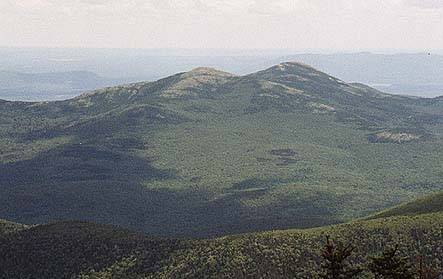 Last December, President Bush quietly signed into law the New England Wilderness Act, which augments several existing wilderness areas and creates three entirely new ones—74,000 new acres of wilderness in all. Hikers and other wilderness enthusiasts in the northeast should thank their lucky stars. The bill is an aberration, a consequence of rare support from Congressional Republicans, whose championing of environmental issues has been virtually unheard of for the past six years.
Last December, President Bush quietly signed into law the New England Wilderness Act, which augments several existing wilderness areas and creates three entirely new ones—74,000 new acres of wilderness in all. Hikers and other wilderness enthusiasts in the northeast should thank their lucky stars. The bill is an aberration, a consequence of rare support from Congressional Republicans, whose championing of environmental issues has been virtually unheard of for the past six years. The impetus for sponsoring new wilderness areas came from the new US Forest Service management plans for the Green and White Mountain National Forests. It may seem surprising that the USFS, which exists primarily to facilitate logging in the National Forests, favors expanding wilderness, but it deserves credit for recognizing that although logging will continue in its northeastern forests, recreation is now the primary use.
Like any bill passed by Congress, the Wilderness Act needed sponsorship. Senators Judd Gregg and John Sununu and Representatives Charlie Bass and Jeb Bradley, all Republicans from New Hampshire, co-sponsored bills with strong backing from Vermont’s Democratic and Independent delegation.
 These New Hampshire Republicans, though fiscally conservative, take a moderate approach to environmental issues. Gregg and Bradley, in particular, have a real affinity for the outdoors—Bradley is a member of the Appalachian Mountain Club’s New Hampshire 4000 Footer Club, and all members are strongly supported by hunting and fishing groups. Their stance was good politics, as well. With the electorate clearly leaning Democratic last fall, the New England Wilderness Act offered a chance for distinction from President Bush.
These New Hampshire Republicans, though fiscally conservative, take a moderate approach to environmental issues. Gregg and Bradley, in particular, have a real affinity for the outdoors—Bradley is a member of the Appalachian Mountain Club’s New Hampshire 4000 Footer Club, and all members are strongly supported by hunting and fishing groups. Their stance was good politics, as well. With the electorate clearly leaning Democratic last fall, the New England Wilderness Act offered a chance for distinction from President Bush. The Senate bill passed unanimously, and the House measure seemed assured of success until opposition appeared from an unexpected quarter—Vermont’s Republican governor, Jim Douglas. Citing the negative impact to the local economy (i.e. the logging industry and ATV-enthusiasts) around Glastenbury Mountain, one of the new wilderness areas in Vermont, Douglas wrote Richard Pombo and Bob Goodlatte, who as respective Republican Chairman of the House Natural Resources and Agriculture Committees had the power to halt the bill. A notorious supporter of property rights and a persistent critic of the Endangered Species Act, Pombo apparently did not need much persuasion.
The New Hampshire delegation tried to separate the act into two bills to allow passage of the New Hampshire sections, but their efforts failed. Finally, despite considerable bickering and accusations thrown both ways, Vermont Senators Pat Leahy and Jim Jeffords, and Bernie Sanders, Vermont’s socialist Representative, negotiated a compromise with Douglas that reduced the proposed Glastenbury wilderness by 6000 acres.
The revised act sailed through Congress and with the Presidential signature, it became law on December 1st. It was not enough, however, to save Bass and Bradley from embarrassing upsets in the November elections. Pombo was also defeated, while Sanders replaced Jeffords in the Senate. To Bass and Bradley’s credit, their support for the bill did not waver in the post-election lame duck Congress.
What exactly does the New England Wilderness Act preserve? Having hiked mostly in New Hampshire, I cannot speak to the Vermont areas, but I know New Hampshire’s new Wild River Wilderness Area and the enlarged Sandwich Range Wilderness area well. Neither is untouched wilderness: the Wild River’s main trail, which is remarkably straight and gradual, is not the result of painstaking labor but rather the convenient bed of an old logging railroad. The Sandwich Range has seen less timber extraction, but its rugged hills have a long history of recreation, and signs of old farm fields and dwellings abound among its lesser hillsides. The history of human use is part of the charm and fascination of these beautiful, isolated regions.
The new wilderness areas are a bright spot amidst an otherwise depressing parade of environmental news. They should be
 not taken as proof of the natural world’s health or an excuse for development. Rather, they are a repository of tranquility where we can acknowledge humanity’s complicated relationship with nature and, I hope, resolve to do better.
not taken as proof of the natural world’s health or an excuse for development. Rather, they are a repository of tranquility where we can acknowledge humanity’s complicated relationship with nature and, I hope, resolve to do better.
No comments:
Post a Comment